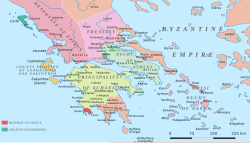Boniface of Verona
Boniface of Verona | |
|---|---|
| Reign | 1294–1317/18 |
| Predecessor | Guy II de la Roche (Gardiki and Salamis), Boniface's wife (Karystos and Aegina) |
| Successor | Marulla of Verona and Alfonso Fadrique |
| Born | c. 1270 |
| Died | 1317 or 1318 |
| Noble family | Family of Verona |
| Spouse(s) | Agnes de Cicon (?) |
| Issue | Marulla, Helen, Thomas |
| Father | Francesco of Verona |
| Mother | Unknown |
Boniface of Verona (
Life
Boniface was born probably around 1270, as the son of Francesco of Verona, and grandson of Giberto I of Verona, one of the three original Lombard barons, known as the "triarchs", who divided the island of Negroponte (Euboea) in central Greece between them.[1][2] Boniface's father, as a younger son, did not inherit his father's triarchy. The identity of Boniface's mother is unknown.[1]
Career under Guy II

Boniface was the youngest of three brothers. He inherited a single castle from his father, which he sold in 1287 in order to arm and equip himself and ten attendants, and went to the court of the
In 1296, Boniface turned his attention to his home island of Euboea. In the 1270s, most of Euboea had been captured from the Lombards for the
In 1302 or 1303, following the sudden death of the Greek ruler of Thessaly,
Battle of Halmyros and aftermath
Almost immediately the new Duke was confronted by the threat of the mercenaries of the Catalan Company. Since 1306, the Catalans had been raiding Thessaly from the north. Walter of Brienne now engaged them to fight against John II Doukas, who had turned against the Frankish tutelage and, seeking to make himself independent, joined forces with Epirus and the Byzantines. The Catalans captured and garrisoned more than thirty fortresses around
The Battle of Halmyros shattered the status quo of Frankish Greece: the bulk of the Frankish nobility was dead, and the Duchy of Athens was swiftly and without much resistance taken over by the Catalans.

Nevertheless, during the 1310s Boniface remained one of the most powerful lords of Frankish Greece: he not only controlled most of Euboea, as well as Aegina and Salamis, but was also the wealthiest of the Euboeote lords.[1] His relations with Venice remained strained, as the Republic suspected him of designs to install himself as lord of all Euboea, with Catalan assistance. As a result, the Venetians began fortifying their colony at Chalkis, for which purpose all the local barons, except for Boniface, agreed to contribute money. In addition, Boniface was engaged in disputes with the local Venetian authorities over piracy by some of his subjects against Venetian shipping, which led to the confiscation of goods by the Venetian bailo at Chalkis.[1][19] In 1317, however, in a dispute between Boniface and the Venetian Andrea Cornaro, ruler of half a triarchy, the Catalans took the side of the latter and supplied 2,000 soldiers to bolster the garrison of Chalkis.[1]
In the same year, the new Catalan vicar-general, Alfonso Fadrique, arrived in Greece. Boniface quickly concluded an alliance with the Catalan leader, marrying his daughter Maria (Marulla) to Fadrique, while virtually dispossessing his other daughter Helen and his son Thomas of their inheritance.[1][20] Soon after his arrival, Fadrique and his men invaded Euboea and probably conquered most of it. Fadrique possibly intended to install his father-in-law as the island's ruler, but Boniface died in late 1317 or early 1318. Diplomatic pressure from his father, King Frederick III, and a Venetian victory at sea, forced Alfonso to withdraw by the end of 1318. A protracted dispute now began between the Fadriques, who claimed the full inheritance of Boniface, particularly the castles of Karystos and Larmena on Euboea, and Venice, which reluctantly supported the claims of Boniface's son Thomas, who was a Venetian citizen. In the end, Venice managed to secure control of Larmena. Over the following decades, the Republic gradually extended its power over the island, until finally it acquired Karystos from Alfonso Fadrique's heir, Boniface Fadrique, in 1365.[1][21][22]
References
- ^ a b c d e f g h i j k l m n Luttrell 1987.
- ^ Setton 1976, pp. 424, 434 (note 143).
- ^ Miller 1908, p. 193.
- ^ Miller 1908, pp. 192–193.
- ^ Miller 1908, pp. 193–194.
- ^ Fine 1994, pp. 243–244.
- ^ Miller 1908, p. 209.
- ^ Setton 1976, pp. 438–440.
- ^ Miller 1921, p. 133.
- ^ Miller 1908, pp. 220–221.
- ^ Miller 1921, pp. 119–120.
- ^ Fine 1994, pp. 241–242.
- ^ Fine 1994, pp. 242, 244.
- ^ Miller 1908, pp. 226–229.
- ^ Fine 1994, p. 242.
- ^ Miller 1921, p. 121.
- ^ Miller 1908, p. 231.
- ^ Miller 1921, pp. 121–122.
- ^ Fine 1994, p. 244.
- ^ Setton 1976, p. 450.
- ^ Setton 1976, pp. 450–451.
- ^ Fine 1994, pp. 244–245.
Sources
- ISBN 0-472-08260-4.
- Luttrell, Anthony (1987). "da Verona, Bonifacio". ISBN 978-8-81200032-6.
- OCLC 563022439.
- OCLC 457893641.
- ISBN 0-87169-114-0.
